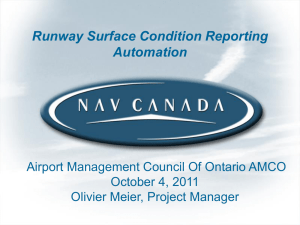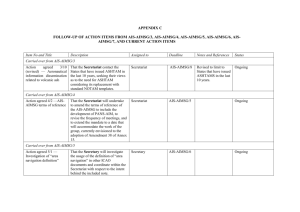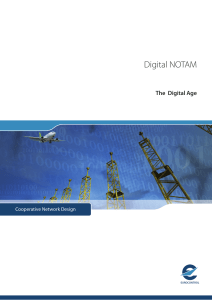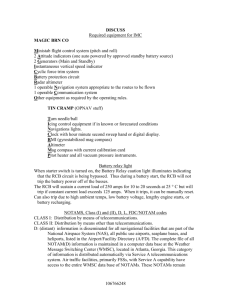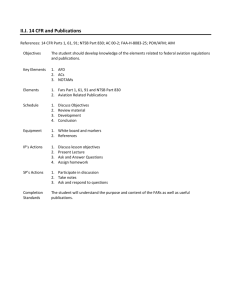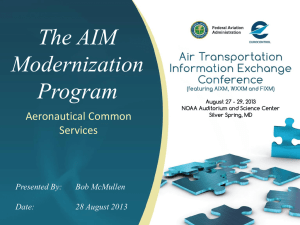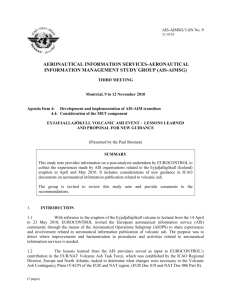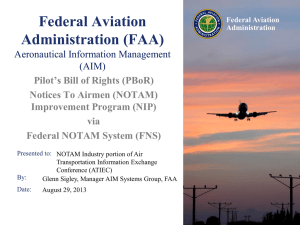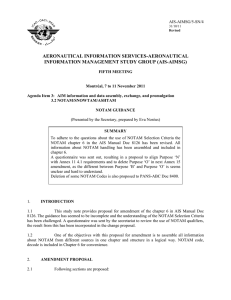A Tour of AIXM Concepts (Aeronautical
advertisement
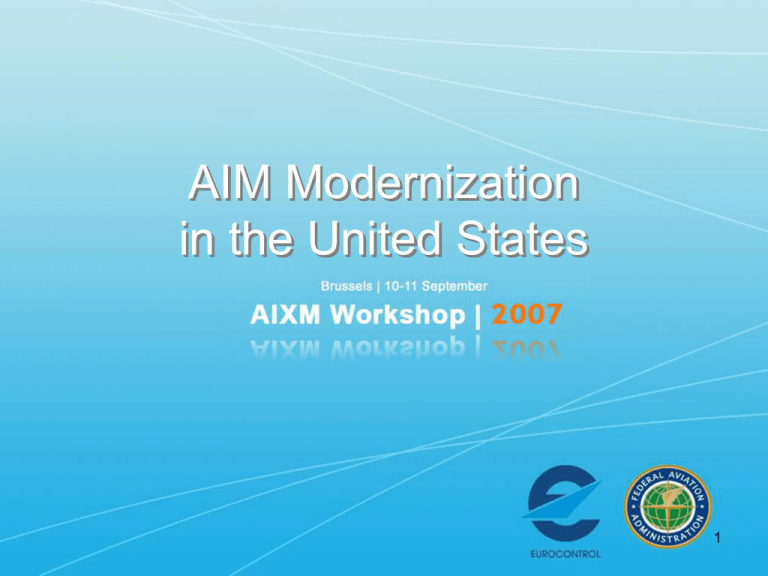
AIM Modernization in the United States 1 Topics • • • • • International Trends AIM Mission and Architecture Solution Components United States NOTAM Realignment status Conclusions 2 Products versus Data • Products are presentations (Views) of data – Effective at date of publication • The primary user of [paper] products is humans – Machines have to interpret products to extract underlying data Hypertext Web Display Publications • The real value is in the data 3 The legacy of ICAO Annex 15 • ICAO Annex 15 describes the product requirements for the Aeronautical Information Service (AIS) (2 Products) RESTRICTED AIRSPACE ACTIVE RUNWAY CLOSED Baseline (Static Situation) Delta (Dynamic Changes) Aeronautical Information Publication Notice to Airman 4 AIS Stovepipes • Historically we set up stovepipes to create products – Customers are responsible for integrating products into view of the aviation system – We cannot ensure the products are consistent NASR NOTAMs ACES ETMS DAFIF DOF SUA ALTRV TPP NFD … Aeronautical Products Customers 5 What can we learn from this? • We don’t have to live in the “product-centric” past – We create many systems to do the same thing to the same basic data elements – Example of 2 Aeronautical Notices • Notice to Airman (NOTAM) • Special Use Airspace (SUA) status • Aeronautical information data products have common themes – Identification and Operation [ What ] • Description (KIAD), Status (Open/Closed) – Period of Validity [ When ] – Geometry [ Where ] • Point, Line, Polygon – Latitude, Longitude, Altitude 6 What is a NOTAM? • Notice that the published information has changed • NOTAM – Notice to Airmen – A0794/06 (09/027) - RUNWAY CLOSED 10/28 12 SEP 04:00 UNTIL UFN + Aeronautical Information Identification & Operation 12 Sep 0400 GMT Until Further Notice Period of Validity + Geometry Message 7 Another notice Military Airspace Status • Military Airspace status – Buckeye Military Operation Area (MOA) • Activated 0900 to 1300 on Sep 9 2006 Buckeye MOA Activated + Aeronautical Information Identification & Operation 9 Sep 2006 0900 to 1300 GMT Period of Validity MOA boundary + Geometry Message 8 AIM needs a common transaction model NOTAM Temporary change to aeronautical information SNOWTAM, ASHTAM Temporary change to airspace and surface conditions Military Airspace Temporary activation of refueling and military operating areas Route Availability / Traffic Restriction Temporal restriction on traffic flows and routing 9 AIM needs detailed aeronautical data that goes beyond Annex 15 Airport Mapping and Survey information 10 What’s changed? • International Recognition that we need to move from text-based products • There is a global exchange model available – Aeronautical Information Exchange Model (AIXM) • Describes aeronautical information and relationships – Designed for system to system exchange of data • We now understand that existing legacy products can be created from base NAS data – Publications – NOTAMs – Charts (after adaptation for best presentation) • Data Quality starts at the beginning of the process (survey) and must be maintained – Trace-ability of data source and modification – Chain-of-Custody 11 AIM Mission in the United States • To provide value to our customers – Providing services supporting safe and efficient air traffic operations. • We are successful when we – Provide services needed by our customers today – Develop new services to meet future needs • We are committed to – International aeronautical information coordination to improve data interoperability for our customers – Supporting aeronautical data developers and producers to ensure high quality data for our customers – Transform using modern methodologies and technology to provide AI services quickly, efficiently and safely for our customers 12 Draft Operational Concept Create Airport Obstruction Evaluation Procedure Development Airspace and Rules Forest Service Airspace Design Assemble Collect Configuration Manage Integrate Quality Control Customers Services Pilots Airlines Air Traffic Services Military Publications Charts Data Services Flight Planning Pilot Briefing Adaptation Performance Metrics Cost of Services 13 Business View AIM Enterprise Develop Policy Update ATC and Military Publish Dynamic Data Acquire Weather Observations Acquire Navigation Aids Evaluate Obstacles Build Adaptation Manage Transient AI Maintain Persistent AI Data Acquire Airport Data Brief Pilot / Plan Flight Publish Static Data Design & QC Procedures Evaluate Airspace Manage Flow Procedures/ Restrictions Design Airspace Maintain Air Traffic Data Analyze Airspace Usage Calculate Fee-forService Publications Charts 14 A Case for Change Our AIS developers, providers and customers are changing • Data developers are producing better data … digitally – Airport layouts – Procedure development tools – Survey data • Data customers have sophisticated demands for digital data – Aerodrome Mapping Databases (AMDB) – Electronic Flight Bags (EFB) • NextGen modernization is changing the operating environment – System Wide Information Management (SWIM) – Rise of web services and XML 15 Need New Approach Global AIS Legacy AIS • Product oriented with multiple duplicative data chains • Paper based • Policy-challenged by an array of policy and procedure manuals. • Limited by technology limitations Next Generation AIM • Streamlined digital data collection and distribution processes • Data integrity with high accuracy and timeliness. • Modern methodologies • Enabled by consistent policy 16 AIM Solution • Digital data and service-oriented • Standardized information model and exchange format Aeronautical Info Systems Products Data Originators • Policy realigned with modernized system Customers 17 Enabling a Digital Aviation Environment • Standardize aeronautical information – Information coded in computer readable format – Elimination/reduction of free-form text – Founded on common information meanings and representations • Geographically reference information – Provide ability to plot aeronautical information on maps 18 Enabling a Digital Aviation Environment (continued) • Rethink aeronautical information management – Information commonalities • NOTAMs, Special Use Airspace activations, GPS Outages • Merge static and dynamic information – Aeronautical data isn’t static – NOTAM – “Temporary Change to Aeronautical Data” 19 Service Oriented Architecture • Distributed • Modular and interoperable – At service, not lower, level • Independent of underlying platforms or programming languages – Not tied to a particular technology • Complies to standards • Uses Web-services 20 Implementing Policy Realignment • Coordinate with Policy / Procedures / Regulatory / Standards Organizations from the outset • Involve customers -- stakeholders / users / bargaining -- units from the outset • Resolve legal issues early • Generate and validate new / revised policies / procedures for AIM prototypes • Generate and validate new / revised policies / procedures as Next Generation AIM is developed 21 Status of United States NOTAM Realignment Strategy 22 Why Modernize? • Must respond to customer concerns – – – – ICAO standardization Local NOTAM accessibility Data reliability, accuracy, and timeliness Digital delivery of data • Need to operate more efficiently – Resources are limited – Improve service delivery without increase in cost • Need to work cooperatively with stakeholders – May 2007 • DoD/FAA formed partnership to harmonize/consolidate NOTAM system • Held Industry Day 23 Modernization Goals • Improve the quality of NOTAMs – Provide meaningful information – Enhance NOTAM interpretation • Graphical depiction necessary – Improve reliability and accessibility • Digital data exchange will enhance filtering and sorting • Conform to ICAO standards • Provide a single source for all NOTAMs – One collection and distribution point for all information – Consolidate inefficient legacy systems for improved customer service • Balance diverse customer needs – Airlines, ATC, General Aviation, International, Military 24 Current NOTAM Process NOTAM Authority System System DINS DoD DINS CFS NIWS/AMC DoD AISR AISR AIDAP/XML NTS NES USNOF SOS TFRB NES USNOF ARTCC NES USNOF CARF NES USNOF Int’l NOF DoD, Public FS21 AVN USNOF DINS FS21 OASIS AFSS NES NOTAM Users AFSS OASIS PilotWeb/ CDM/ATCSCC Public, Airlines Towers, TRACONs NDS USNS NRS WMSCR AIS Providers ERIDS /ERAM ARTCC Legacy Users 25 Future NOTAM Process NOTAM Authority All Users Int’l NOF Service NOTAM entry Federal NOTAM System USNS + DINS = FNS Service NOTAM Users NOTAM query All Users Electronic interface All Systems All Users 26 Roadmap Activity Date Result Industry Day May ’07 Commitment by U.S. Government to Modify NOTAM System Initial Policy Change Oct ‘07 NOTICE: D NOTAMs redefined consistent with ICAO definition (reclassify civil L NOTAMs) System and Additional Policy Changes Aug ‘09 One Federal NOTAM System (FNS) with Full ICAO Implementation System Enhancements 2010+ Aeronautical Information eXchange Model (AIXM) NOTAM Capabilities 27 Initial Policy Change for Oct/Nov 2007 • Expand definition of a Distant (D) NOTAM – Adopt ICAO definition for aerodrome movement area • Includes taxiways, ramps, aprons, lighting • All D NOTAMs will be prefaced with a keyword • Label unverified reports of hazards – Information that meets NOTAM criteria but is unverified will be tagged with (U) and disseminated as D NOTAM • Applicable only where letters of agreement exist • Label other information that doesn’t meet ICAO criteria – Other information that may impact aircraft operations will be tagged with (O) and disseminated as D NOTAM 28 NOTAM D Examples For Oct/Nov 2007 • Runway condition – !MIV 07/123 MIV RWY 10/28 CLSD 0709021200-0709021600 • Taxiway status – !RDU 07/123 RDU TWY A CLSD BTWN A1, A2 TIL 0709011600 • Ramp status – !MEM 07/123 MEM RAMP PAEW FEDEX CARGO EAST • Other status information – !LOU 07/123 LOZ (O) CONTROLLED BURN 6.5SM NORTH TIL 0708302200 29 Roadmap Activity Date Result Industry Day May ’07 Commitment by U.S. Government to Modify NOTAM System Initial Policy Change Oct ‘07 NOTICE: D NOTAMs redefined consistent with ICAO definition (reclassify civil L NOTAMs) System and Additional Policy Changes Aug ‘09 One Federal NOTAM System (FNS) with Full ICAO Implementation System Enhancements 2010+ Aeronautical Information eXchange Model (AIXM) NOTAM Capabilities 30 Next Steps • Town hall meeting TBD – Interactive, web based forum, question and answer session to answer questions and resolve any issues • NOTICE effective October 2007 • NOTAM Handbook update published July 31, 2008 • Kick off next phase NOTAM Realignment – Continue weekly meetings until ICAO standardized document • Begin federal system consolidation 2008 • Goal: Full ICAO implementation including SNOWTAMs and ASHTAMs – 28 August 2009 31 Digital NOTAMs Digital NOTAMs Federal Aviation Administration Modernizing the United States NOTAM System By: Dr. Brett K. Brunk and Amy Johns Aeronautical Information Management Date: June 2007 To be discussed later today 32 International Adoption From 2006 Global AIS Congress 1 –AIM is core ATM enabler • Australia • Canada • China 9 - Civil/Military partnerships 2 – Enlarged scope • EuroControl • Japan • South Africa 3 – Move from product to data approach 8 – Business Focus • United States 7 - Human Capital 4–Ensure quality for all phases of flight 6 - Global AIM Partnerships 5 – Regional Excellence 33 A couple things to remember… • Quality from the very beginning – Quality check as data enters the system • Authorization and accuracy – Focus on end-to-end quality – Complete Chain-of-Custody • Move to digital delivery of Aeronautical data – – – – Build products from base AI data Merge like data types (NOTAMs and SUAs) Single entry – Multiple Views We will still have to maintain many of our legacy formats • Aeronautical data is not just traditional AIS and NOTAMs • Its Global… 34
